-
 Art of Wellness Acupuncture & Traditional Chinese Medicine (TCM)11704 Wilshire Blvd, Suite 295, Los Angeles, CA, 90025
Art of Wellness Acupuncture & Traditional Chinese Medicine (TCM)11704 Wilshire Blvd, Suite 295, Los Angeles, CA, 90025
myartofwellness@gmail.com310-451-5522 Office Hours
MonClosedTue7:30 am --4 pmWed7:30 am --4 pmThu7:30 am -- 4 pmFri7:30 am -- 4 pmSat7:30 am -- 4 pmSunClosedOur office opens from Tuesdays to Saturdays 7:30 am to 4 pm, will be closed on Memorial day, Independent day, Labor day, Thanksgiving day, Christmas and New year.
-
Recent Posts
- Chinese New Year 2026: Year of the Horse
- Acupuncture and TCM Treatment for Perimenopause Symptoms
- How to Treat Insulin Resistance With Acupuncture and TCM
- How to Treat Metabolic Syndrome With Acupuncture and TCM
- How to Treat Syncope With Acupuncture and TCM
- How to Treat Thoracic Outlet Syndrome With Acupuncture and TCM
- How to Treat Dupuytren’s Contracture With Acupuncture and TCM
- How to Treat Nutcracker Syndrome With Acupuncture and TCM
- How to Treat Rosacea With Acupuncture and TCM
- How to Treat Perioral Dermatitis With Acupuncture and TCM
- Lymphatic Drainage With Acupuncture and TCM
- How to Treat Turf Toe With Acupuncture
- How to Treat Nerve Pain With Acupuncture and TCM
- How to Treat Watery Eyes With Acupuncture and TCM
- How to Treat Ovarian Cysts With Acupuncture and TCM
- How to Treat Dystonia With Acupuncture and TCM
- Sign up to receive news and updates and get my free report:“The Top 10 Reasons to Try Acupuncture”

November 2025 M T W T F S S 1 2 3 4 5 6 7 8 9 10 11 12 13 14 15 16 17 18 19 20 21 22 23 24 25 26 27 28 29 30
Autoimmune Disease
How to Treat POTS With Acupuncture and TCM
By Qineng Tan, L.Ac., Ph.D. and Xiaomei Cai, L.Ac., Ph.D.

Do you often feel shaky, like you’re fainting, or experience dizziness, especially when you’re getting up from sitting down or lying down? Do you feel like you have a rapid heartbeat, or shortness of breath? Postural orthostatic tachycardia syndrome, known as PoTS syndrome, or POTS, is a condition that causes unstable blood pressure when changing positions. Acupuncture and TCM can help relieve dizziness and other symptoms of POTS.
Postural tachycardia syndrome (or postural orthostatic tachycardia syndrome) is a chronic disorder related to the autonomic nervous system that causes people to experience dizziness and increased heart rate when they move into an upright position; this is known as orthostatic intolerance, which is a type of dysautonomia.
POTS syndrome is fairly common, affecting up to 3 million people in the U.S. POTS occurs more often in people assigned female at birth, and often first shows up during the teenage years.
The most common symptom of POTS is feeling light-headed when changing your position from sitting to standing, or when getting up from lying down.
Whenever we have been sitting or lying down for a while, blood pools in the lower parts of the body. When we get up, the autonomic nervous system starts a series of actions to move blood back up into the top half of the body. This involves squeezing blood vessels, and releasing adrenaline and norepinephrine, to make the heart beat faster.
When a person has POTS, more blood tends to pool in the legs, and the nervous system process doesn’t cause the normal, quick response from the blood vessels, so more hormones are released, which can cause the person’s heart rate to increase, and a dizzy, faint feeling.
Medical science has not yet discovered exactly what causes POTS, but there are different characteristics that allow for categorizing these different types of POTS syndrome:
- Neuropathic POTS – damage to small fiber nerves that control blood vessel constriction in the abdomen and limbs
- Hyperadrenergic POTS – when a person has elevated levels of norepinephrine
- Hypovolemic POTS – when a person has unusually low blood levels
- Secondary POTS – when POTS symptoms are related to another condition that causes neuropathy, such as Lyme disease, diabetes, or autoimmune disorders like Lupus or celiac disease.
While POTS is not rare, it can be difficult to get a diagnosis, because the criteria can be vague, and the symptoms can so often be related to other conditions, or just seem “normal.”
For many people, POTS is truly debilitating and can have a serious, negative impact on daily life. It can also contribute to feelings of anxiety and depression. Acupuncture and TCM offer an adjunct or alternative treatment for POTS that can help with dizziness, irregular heartbeat, digestive problems, muscle weakness, migraines, trouble sleeping, and other symptoms, all at the same time.
Top 10 POTS Symptoms
The primary symptoms of POTS are related to the cardiovascular system: rapid heartbeat, and dizziness. However, there can be many other POTS symptoms.
- Irregular heart rate, rapid heart rate, fast heartbeat, chest pain, heart palpitations
- Dizziness, especially when standing up or getting up from lying down, feeling faint
- Breathing problems: hyperventilating, bronchial asthma, shortness of breath
- Constipation, diarrhea, nausea, abdominal pain
- Muscle weakness, muscle pain, tremor
- Skin rash, flushed face, flushing, sweating
- Migraine headaches
- Cognitive issues, brain fog, difficulty concentrating
- Trouble sleeping
- Frequent urination, nocturia
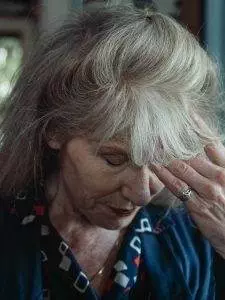
Other symptoms of POTS may include: tinnitus (ringing in the ears), blurred vision, red or purple appearance of the legs when standing up, and a “jittery” feeling or general nervousness.
As with many syndromes, different people will experience different combinations of symptoms. While dizziness and rapid heartbeat are the signs most commonly associated with POTS, many people with POTS will also suffer from abdominal pain and gastrointestinal problems, perhaps without realizing there is a correlation.
POTS symptoms may resemble many other conditions, such as:
- Chronic fatigue syndrome, ME/CFS
- Graves disease
- Other heart conditions that involve tachycardia
- Anemia
- Stroke
- Epilepsy
- Adrenal fatigue
- Drug use
- Eating disorders
- Benign paroxysmal positional vertigo
- Ménière’s disease
Because POTS is often misunderstood or misdiagnosed, many patients will be offered medications to manage headaches, vertigo, or depression, which may not offer much relief.
Medical Treatment for POTS
As there is no definitive cure for POTS, Postural orthostatic tachycardia syndrome treatments typically aim to manage symptoms and improve quality of life.
Dietary modifications are a fundamental component of POTS management. Adequate daily fluid intake is crucial. A diet that includes plenty of salt helps maintain blood volume, aiding blood flow to vital organs. Patients are typically advised to avoid alcohol and carefully monitor caffeine intake, as these substances can exacerbate symptoms.
Exercise is gradually introduced, often starting in reclined or horizontal positions, with the goal of increasing exercise tolerance over time. Physical therapy helps retrain the autonomic nervous system, enhancing blood circulation.
Compression garments can help reduce blood pooling, and specific postures while sitting or sleeping may alleviate symptoms. Identifying triggers such as prolonged sitting, heat, or certain drugs allows for better symptom control. Regular monitoring of blood pressure and pulse, along with adequate sleep hygiene, aids overall well-being.
While no single pharmacological solution is universally effective, some medications may be prescribed based on individual symptoms. These may help to improve blood volume, aid sodium retention, reduce heart rate, and enhance blood vessel constriction.
While POTS symptoms may intermittently improve with medications and lifestyle modifications, the underlying cause of POTS may persist. Acupuncture and TCM treatment can provide a holistic solution for individuals living with POTS, which may help to address the root causes of this syndrome.
Can Acupuncture Help POTS?
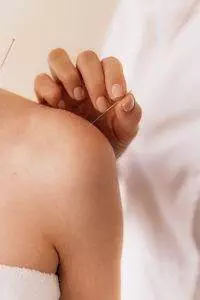
POTS is a kind of Dysautonomia; this is a general term that describes conditions that involve malfunctioning of the autonomic nervous system. This causes people’s bodies to have problems with regulating the sorts of functions that are typically automatic, like the beating of the heart, circulation of blood, breathing, and temperature control.
Western medicine offers some treatments that can help address individual symptoms of dysautonomia, but it does not have a way of treating the root of the problem. It can be difficult to get proper treatment, because people who suffer from POTS and other kinds of dysautonomia often seem reasonably healthy, and their complaints—dizziness, headaches, mental health problems—seem vague.
Acupuncture and TCM have been used to treat these kinds of problems for centuries. Acupuncture treatment can help provide positive effects on the subtle communications of the nervous system, as well as the heart rate, and physiological symptoms of anxiety. According to TCM theory, several organ systems may be involved and need support: not only the heart, but also the kidneys or spleen.
Studies have shown that acupuncture for dysautonomia can help relieve symptoms like heart palpitations, insomnia, and digestive problems.
A qualified acupuncturist is also well-versed in nutrition and can offer more detailed information regarding dietary and lifestyle changes that can help each individual patient. Your TCM provider will spend time learning more about you, so that they can offer personalized advice.
Acupuncture Near Me for POTS in West Los Angeles
TCM and acupuncture can help people with all types of autoimmune disorders, nerve disorders, and conditions involving fatigue and dizziness that may be difficult to solve with conventional methods. Acupuncture works on a deeper, more subtle level to help address complex syndromes. If you are regularly experiencing trouble with feeling light-headed, having unexplained headaches and sleep problems, it may be time to seek a more holistic alternative treatment.
*This article is for education from the perspective of Traditional Chinese Medicine only. The education provided by this article is not approved by FDA to diagnose, prevent, treat and cure human diseases. It should not stop you from consulting with your physician for your medical conditions. Traditional Chinese Medicine is based on Qi, which is an invisible force that usually cannot be observed by modern science. Because science focuses on testing ideas about the natural world with evidence obtained through observation, these aspects of acupuncture can’t be studied by science. Therefore acupuncture and Chinese herbs are often not supported by double-blind, randomized trials, and they are considered alternative medicine therapies in the United States.
How To Treat Psoriasis With Acupuncture and TCM
By Xiaomei Cai, L.Ac., Ph.D. and Qineng Tan, L.Ac., Ph.D.
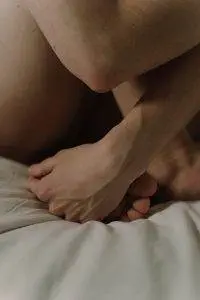
Rash, scaly skin, itchy skin? These could be signs of psoriasis, a chronic skin condition that causes skin to form in thick, scaly, discolored patches, especially on the elbows and knees. Acupuncture and TCM treatment can help relieve psoriasis and address the root causes of this autoimmune skin disease.
Autoimmune disorders stem from the body’s immune system malfunctioning. In the case of psoriasis, the body produces too many skin cells, forming thick scales, known as “plaques,” or a bumpy rash.
As with other conditions that involve skin rashes or other skin problems—like vitiligo, eczema, dermatitis, scleroderma, celiac disease, and lupus—psoriasis tends to flare up periodically, becoming worse for a few weeks or months at a time, and then improving. A psoriasis flare up happens because of widespread inflammation.
What Causes Psoriasis Flare Ups?
Getting a cut or burn on your skin can trigger a psoriasis flare up.
So can infections like a staph infection, strep infection, helicobacter pylori bacterial infection (which can also cause stomach ulcers), or chlamydia.
Viral infections like HIV and hepatitis C can trigger psoriasis. Fungal infections like candida, or yeast infections, can also trigger a psoriasis flare up.
Psoriasis affects millions of people, of all ages. Psoriasis rash can cause intense itching (pruritus), so much so that it can affect a person’s ability to concentrate in daily life and can also have a negative impact on sound sleep.
Medical research has not yet discovered exactly what causes psoriasis, but it may be partly due to genetics and partly due to environmental factors. It is not uncommon for a person to have psoriasis and also have another autoimmune condition, such as lupus, celiac disease, Crohn’s disease or inflammatory bowel disease (IBD), multiple sclerosis (MS), or autoimmune thyroid disease.
Acupuncture and TCM are excellent modalities for helping to relieve the symptoms of skin conditions like psoriasis and many autoimmune disorders. Acupuncture and herbs can help relieve itchy rashes and also help to improve the functioning of the immune system. Acupuncture treatment can also help with the emotional and psychological toll of dealing with psoriasis.
Top 5 Types of Psoriasis
Plaque psoriasis is by far the most common type of psoriasis, accounting for about 80% of cases. Other types of psoriasis are more rare and can be very serious.
- Plaque psoriasis or Psoriasis vulgaris – the most common type of psoriasis; thick scales that are red or pink with a silvery coating on them. These patches, or plaques, can itch intensely.
- Guttate psoriasis – small red or pink bumps that appear suddenly, covering the torso, arms, and/or legs. This condition sometimes clears up and does not return. In some cases, though, it can keep coming back, or later turn into plaque psoriasis. Guttate psoriasis may be triggered by infections, like strep throat.
- Pustular psoriasis – this is a rash of painful bumps that are filled with pus. Generalized pustular psoriasis is an extreme version of this condition, which can quickly cover the whole body and be accompanied by other symptoms like fever, headache, and muscle weakness. Generalized pustular psoriasis is a serious condition requiring medical care.
- Inverse psoriasis or Intertriginous psoriasis – develops in areas where skin folds upon itself, like armpits and around the genital area
- Erythrodermic psoriasis – usually develops as a more severe condition after a person has already been struggling with psoriasis. The skin becomes very red and appears to be burned. The person will feel very ill, with fever and chills and a rapid heart rate. Requires immediate medical attention.
Psoriasis is not only intensely uncomfortable, but the scaly skin can also have a significant impact on a person’s confidence in their appearance. These factors can mean that having psoriasis can have a negative effect on a person’s mental health and emotional health.
Acupuncture, when used as an adjunct therapy for psoriasis and other autoimmune conditions can help address anxiety, depression, and mood disorders, as well as helping with physical symptoms.
Medical Treatments for Psoriasis
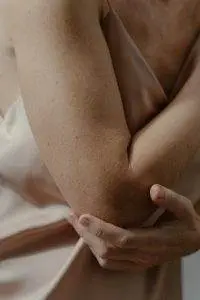
Conventional treatment for psoriasis aims to help slow down the overproduction of skin cells and relieve pain and itching.
Topical Medications for Psoriasis
Topical products are applied directly to the skin.
- Corticosteroids: Frequently prescribed for mild to moderate psoriasis, available in various forms like oils, creams, lotions, etc.
- Vitamin D Analogues: Synthetic forms of vitamin D that slow skin cell growth, used alone or with corticosteroids.
- Retinoids: Available as gel or cream, they reduce skin cell growth and may cause skin irritation and sensitivity to light.
- Calcineurin Inhibitors: Calm the rash and reduce scaly buildup, useful in areas of thin skin.
- Salicylic Acid: Reduces scaling of scalp psoriasis and prepares the scalp to absorb medication more easily.
- Coal Tar: Reduces scaling, itching, and inflammation, available in various forms like shampoo, soap, cream, and oil.
Oral or Injected Medications for Psoriasis
Systemic medications may work on the immune system or on skin cell production to help relieve psoriasis.
- Steroids: Injection of triamcinolone into small, persistent psoriasis patches.
- Retinoids: Pills to reduce skin cell production, not recommended during pregnancy.
- Biologics: Injected drugs that alter the immune system to improve symptoms in moderate to severe psoriasis.
- Methotrexate: Weekly oral dose to decrease skin cell production and suppress inflammation.
- Cyclosporine: Oral calcineurin inhibitor for severe psoriasis.
- Treatment approach based on needs and psoriasis severity.
- Start with milder treatments and move on to stronger ones if necessary.
- Pustular or erythrodermic psoriasis may require stronger systemic medications.
Phototherapy exposes the skin to ultraviolet light under a dermatologist’s supervision. UVB can help slow down cell production. Light therapy may use lamp units with bulbs, or a laser may be used to target very specific areas of affected skin.
Can Acupuncture Help Psoriasis?
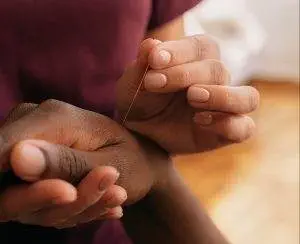
In TCM, elemental factors like heat, wind, dampness, dryness, and so on, are considered to act as pathogens, having a negative effect on bodily systems when they are either in excess or deficient.
According to TCM theory, the root causes of psoriasis may be related to pathogenic factors of excessive heat and dryness. Heat, as a pathogen, can cause redness and itchy skin. Wind can cause dryness of the blood. These conditions in combination can lead to stagnant blood and a fiery heat building up. TCM classifications for diagnosis related to psoriasis would include:
- Blood heat
- Blood stasis
- Blood dryness
- Blood deficiency
An individual, depending on their specific presentation of skin rash and other symptoms, may be diagnosed with a combination of these factors.
In Chinese medicine, the skin and the lungs are connected, with the skin being the outward presentation of what is going on in the lungs. So, acupuncture treatment for psoriasis may focus on strengthening lung Qi.
In other cases, the large intestine may be related; because of dryness, it may not be receiving enough fluid to be able to do the job of moving toxins out of the body.
In some cases, it may be that intense emotions are affecting the liver, causing blood stagnation due to stress. Liver Qi stagnation can cause overheating and for blood to “overflow” from vessels, causing red bumpy rashes.
Thus, herbal remedies and acupuncture treatment will often aim to clear heat, cool the blood, and improve circulation. Many herbs are helpful for this, as well as for helping to reduce inflammation and soothe dryness and itching.
Chinese medicine herbal preparations have been shown by modern scientific studies to inhibit immune-inflammatory reactions, regulate Th cells, and mediate the formation of skin lesions.
Review of scientific studies of TCM for psoriasis have shown that it can be effective for reducing the severity of skin lesions and help prevent recurrences of flare ups.
Acupuncture Near Me for Psoriasis in West Los Angeles
Psoriasis is a painful skin condition that requires special treatment. As an autoimmune condition, psoriasis needs to be addressed on a deeper level, as opposed to simply trying to relieve the itchy, scaly rash on the skin’s surface. TCM offers a holistic way of treating both skin diseases and autoimmune disorders that can bring deep relief. Consider seeking acupuncture as an adjunct treatment for psoriasis.
*This article is for education from the perspective of Traditional Chinese Medicine only. The education provided by this article is not approved by FDA to diagnose, prevent, treat and cure human diseases. It should not stop you from consulting with your physician for your medical conditions. Traditional Chinese Medicine is based on Qi, which is an invisible force that usually cannot be observed by modern science. Because science focuses on testing ideas about the natural world with evidence obtained through observation, these aspects of acupuncture can’t be studied by science. Therefore acupuncture and Chinese herbs are often not supported by double-blind, randomized trials, and they are considered alternative medicine therapies in the United States.
How to Treat Scleroderma With Acupuncture and TCM
By Xiaomei Cai, L.Ac., Ph.D. and Qineng Tan, L.Ac., Ph.D.
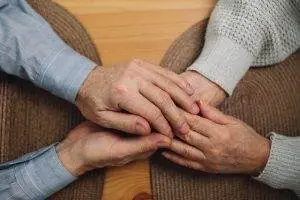
Hard, thickening, tight skin? Itchy, dry skin that is shiny? Changing skin color? These could be symptoms of scleroderma, an autoimmune disorder that causes your body to produce too much collagen. Acupuncture and TCM treatment can help relieve inflammation and pain while helping to resolve the underlying cause of scleroderma.
Scleroderma can be considered a type of dermatosis (skin lesion), and also a type of connective tissue disease (negatively impacting tissues that connect structures in the body), as it usually affects skin and cartilage, often starting in the extremities, and then extending up the limbs towards the trunk.
Collagen is a form of fibrous protein that the body produces to maintain the structure of skin cells, muscles, bones, and connective tissue. The immune system triggers collagen production when we are injured, but in the case of scleroderma, the body is overproducing and accumulating too much collagen.
Localized scleroderma affects primarily the skin tissue, but can also spread to subcutaneous tissues, like fascia and muscles.
In some cases, scleroderma can also impact internal organs, like the esophagus, lungs, heart, and kidneys. This is known as systemic scleroderma.
Top 3 Types of Scleroderma
Localized scleroderma can be differentiated into 3 types:
- Localized scleroderma – a few patches of discolored skin (circumscribed morphea); these skin lesions can vary in size, may be oval shaped, and are usually yellow in the center with a red border.
- Generalized scleroderma – also called generalized morphea, with this type there are more patches of thick, hard skin on various parts of the body, which may overlap.
- Linear scleroderma – more common in children, may show up as one band of affected skin on a limb or on the trunk, with a few patches of morphea. Linear scleroderma on arms and legs may affect the growth and development of that limb, as scleroderma may impact the muscle and bone tissues as well as the skin.
Systemic scleroderma is rare, but happens more commonly in women between the ages of 30 and 50. This type of scleroderma can manifest in different ways.
Systemic scleroderma can sometimes first show up as Raynaud’s phenomenon, or Raynaud’s syndrome, in which the blood vessels in the hands and feet close up when the weather is cold and cause color changes to the skin, as well as sensations of numbness, prickling, tingling, or pain. Stress can also trigger Raynaud’s.
Systemic scleroderma can cause scarring on the skin and internal organs, which can lead to gastrointestinal problems like acid reflux, cardiovascular and pulmonary problems, or renal disease.
Acupuncture treatment can be used as an adjunct treatment to help relieve symptoms of pain related to skin hardening, as well as helping to alleviate heartburn and GERD type symptoms in patients with esophageal symptoms of scleroderma. TCM can also help address the root causes of scleroderma and other autoimmune disorders.
What Causes Scleroderma?
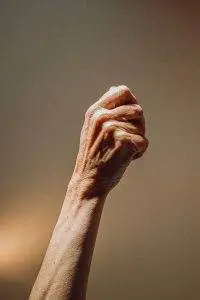
As with most autoimmune disorders, medical science has not yet discovered exactly why some people develop this condition. While it is not passed from parent to child the way genetic diseases are, you are more likely to have scleroderma if someone else in your immediate family has it, too.
It is believed that factors like environmental toxins and/or viral infections can trigger scleroderma symptoms to flare up. The overproduction of collagen is due to abnormal functioning of the immune system.
Because women develop scleroderma more often than men do, it may be that there is a hormonal factor that affects the disease, as well.
Diagnosis and Medical Treatment for Scleroderma
There is no cure for scleroderma, so conventional medical treatments aim to alleviate symptoms and slow down the progression of the disease. The treatment plan may vary depending on the specific manifestations and severity of the disease.
To diagnose scleroderma, doctors rely on a combination of clinical assessments, medical history review, physical examinations, and lab tests. A doctor will first observe skin changes, such as thickening and hardening, then look for internal organ involvement and other symptoms.
Blood tests can help identify specific antibodies associated with scleroderma, such as antinuclear antibodies (ANA), anti-centromere antibodies (ACA), and anti-Scl-70 (anti-topoisomerase I) antibodies. Additionally, blood tests can assess organ function, including kidney and liver function, as well as inflammatory markers.
X-rays, ultrasound, or CT scans may be used to evaluate internal organ involvement, such as lung fibrosis, gastrointestinal complications, and cardiac abnormalities.
A skin biopsy sample may be taken to confirm the presence of fibrosis and assess the degree of inflammation.

Medications that may be recommended for treating scleroderma symptoms include:
- Immunosuppressants: Medications such as methotrexate, mycophenolate mofetil, and azathioprine may be prescribed to suppress the immune response and reduce inflammation.
- Corticosteroids: Oral or topical corticosteroids can help manage inflammation and alleviate symptoms in certain cases. However, long-term use may have potential side effects and is usually minimized.
- Vasodilators: Medications like calcium channel blockers and prostacyclin analogs may be prescribed to improve blood flow and manage Raynaud’s phenomenon.
- Proton pump inhibitors (PPIs): These medications can help manage gastroesophageal reflux disease (GERD) symptoms, which are common in scleroderma patients.
Patients are often advised to make lifestyle changes to manage their condition effectively. These may include:using skin moisturizers and avoiding excessive sun exposure, and using sunscreen with a high SPF, avoiding cold temperatures and stress to prevent triggering Raynaud’s, quitting smoking, and eating an anti-inflammatory diet.
Can Acupuncture Help Scleroderma?
TCM treatment for scleroderma focuses more on addressing the underlying causes of the condition, rather than simply trying to relieve symptoms. An acupuncturist will look closely at the whole person, listen carefully to hear all the symptoms they are experiencing, even those which may seem unrelated, feel their pulse and make other observations, and then ascertain which diagnostic pattern may apply.
According to TCM theory, scleroderma symptoms may occur due to:
- Blood stagnation
- Yang deficiency
- Kidney Qi deficiency or yang deficiency
- Liver and Gallbladder damp heat
- Liver blood deficiency
- Liver win
- Spleen yang deficiency
- Stagnation of cold, wind, and/or damp
Depending on the diagnosis, the TCM practitioner will then plan a treatment protocol to address the root cause, using acupuncture and herbs. For example, herbs can help move stagnant blood, relieving the skin conditions related to scleroderma. Herbs can even help to inhibit collagen production, to help reduce skin hardening.
Acupuncture has been shown to help reduce the number of Raynaud’s attacks.
Moxibustion treatment may also be used to help relieve symptoms related to Raynaud’s phenomenon.
The use of acupuncture for stress relief is also integral to treatment for scleroderma, as stress can trigger a worsening of symptoms.
Acupuncture can help reduce esophageal reflux in cases where esophageal strictures have developed due to scleroderma in the digestive tract and help improve kidney function when kidneys have been impacted by fibrosis.
TCM herbal formulations for scleroderma will be individualized for each patient’s needs. Herbs may be used to help warm and nourish the organs, while clearing dampness and activating stagnant blood and Qi.
Acupuncture Near Me for Scleroderma in Los Angeles
Acupuncture and TCM herbal medicine can be excellent modalities for helping with difficult to treat skin conditions, connective tissue disorders, and autoimmune disorders, including:
- Dermatitis
- Eczema
- Psoriasis
- Vitiligo
- Rheumatoid Arthritis
- Lupus
- Herpes simplex
- Hives, urticaria
- Ehlers-Danlos syndrome (EDS)
If you are experiencing painful skin problems or digestive problems, consider seeking out alternative care in addition to conventional treatments.
*This article is for education from the perspective of Traditional Chinese Medicine only. The education provided by this article is not approved by FDA to diagnose, prevent, treat and cure human diseases. It should not stop you from consulting with your physician for your medical conditions. Traditional Chinese Medicine is based on Qi, which is an invisible force that usually cannot be observed by modern science. Because science focuses on testing ideas about the natural world with evidence obtained through observation, these aspects of acupuncture can’t be studied by science. Therefore acupuncture and Chinese herbs are often not supported by double-blind, randomized trials, and they are considered alternative medicine therapies in the United States.
How to Treat Interstitial Cystitis With Acupuncture and TCM
By Xiaomei Cai, L.Ac. Ph.D. & Qineng Tan, L.Ac., Ph.D.
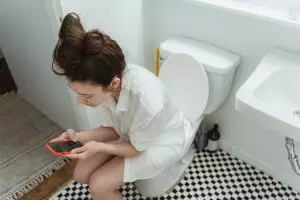
Bladder pain and pressure? Urinary urgency? Pelvic pain that feels like a UTI or bladder infection? Interstitial cystitis is a painful bladder syndrome caused by bladder inflammation. Acupuncture and TCM offer an alternative interstitial cystitis treatment that can help relieve interstitial cystitis symptoms.
Interstitial cystitis is a chronic pain condition that is difficult to diagnose and treat with conventional medicine. It is generally considered a urological or gynecological condition, but actually, men and women can both experience what is sometimes referred to as painful bladder syndrome (IC/PBS) or “frequency-urgency-dysuria syndrome.” Dysuria means “painful urination.”
While interstitial cystitis can be different from person to person, the best way to describe it is feeling like you have the urinary frequency that is characteristic of a UTI or symptoms bladder infection all the time—except that there is no bacterial infection present, so the condition does not get better with antibiotics.
Interstitial cystitis and overactive bladder (OAB) share many of the same signs and symptoms and can sometimes overlap. The primary difference between these two conditions is that interstitial cystitis usually involves pelvic pain in addition to urinary urgency, while overactive bladder involves urinary incontinence, but usually not significant bladder pain.
That feeling of bladder pressure and urinary urgency can really get in the way of your daily activities. People who suffer from interstitial cystitis may feel like they’re going to the bathroom every few minutes all day long. Even though they’re peeing a lot, though, the painful urgency to urinate again returns quickly.
Interstitial cystitis involves irritation and inflammation of the bladder that can ultimately cause a buildup of scar tissue in the bladder and may decrease its capacity to hold urine. There may also be small amounts of blood in the urine (hematuria) due to pinpoint bleeding on the bladder walls.
What Causes Interstitial Cystitis?
Medical science has not yet discovered why some people experience interstitial cystitis (IC). It has been suggested that it may be related to an autoimmune disease attacking the bladder or causing inflammatory cells to develop in the bladder, nerve signals that are causing painful sensations even though nothing is wrong, some type of allergic reaction to chemicals in the urine, or sores developing in the bladder lining.
Some people who suffer from interstitial cystitis may also have IBS, fibromyalgia, migraines, or other chronic pain conditions. There is some evidence that IC is associated with also having an autoimmune condition, such as lupus, rheumatoid arthritis, or a thyroid disorder.
Interstitial cystitis bladder pain is a complex problem with both physical and emotional components. The urgency to pee can become so persistent and painful that it gets in the way of normal life, and even relationships. Fortunately, TCM and acupuncture offer holistic treatment for interstitial cystitis that can help relieve pain and anxiety.
Top 5 Interstitial Cystitis Symptoms
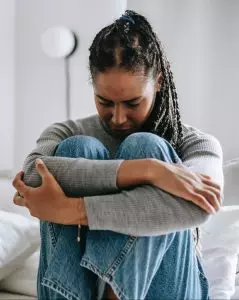
Each person’s experience of interstitial cystitis is unique. For some, the uncomfortable sensations of urinary frequency and bladder pressure may come and go. For others, bladder pain may be constant.
The common symptoms of interstitial cystitis include:
- Urinary frequency, peeing a lot
- Urinary urgency, feeling like you have to pee even when you just went
- Only peeing a small amount when you go
- Bladder pain, bladder pressure, pelvic pain, pain in the perineum
- Pain during sex
Menstruation can cause interstitial cystitis pain to worsen, as can certain foods or drinks, having sex, or sitting for long stretches of time.
Top 10 Triggers of Interstitial Cystitis Pain
People with interstitial cystitis are often advised to keep a record of their eating habits and pay attention to what foods or beverages seem to make their symptoms worse.
Things that may trigger bladder pain include:
- Tomatoes
- Citrus fruits
- Alcohol
- Caffeine – coffee, tea
- Carbonated beverages, soda, pop
- Fruit juice
- Chocolate
- Artificial sweeteners
- Milk and other dairy foods
- Spicy foods
Going on an elimination diet, in which you avoid certain foods for a period of time and see if your symptoms abate, may help.
Interstitial Cystitis Treatment
Medical treatment for interstitial cystitis is focused mainly on mitigating symptoms. Painkillers, antihistamines, and antidepressants are most commonly prescribed to help relieve painful bladder syndrome.
Amitriptyline is approved to treat depression, but is sometimes used to help treat autoimmune-related chronic pain due to fibromyalgia and MS, as well as interstitial cystitis.
Elmiron is a drug specifically approved to help protect the lining of the bladder from irritation. It can take several months for it to start working. It has some serious side effects, including potentially permanent damage to the retinas of the eyes.
Bladder instillations for interstitial cystitis are “cocktails” of medicines that are injected into the bladder with a catheter and held for 15-30 minutes. Treatments may be given weekly or a few times per week over the course of several weeks. Some people get relief from their symptoms with this method. Others may find the catheterization process uncomfortable or painful.
None of these treatments are a cure for interstitial cystitis. TCM and acupuncture offer an alternative treatment for painful bladder syndrome that can relieve pain and address the root cause of the problem.
Can Acupuncture Help Interstitial Cystitis?
According to TCM, the healthy function of the bladder relies heavily on the kidney and spleen, which provide yang energy to warm the bladder. When the Kidney Qi is deficient, the bladder may be too weak to hold urine.
Kidney Qi can be weakened by a long illness, or by repeated UTIs that have not been adequately addressed. It has been noted through medical imaging that prolonged illnesses can cause the bladder to contract in size. It can also become much more sensitive.

Painful urination can begin after someone has a difficult childbirth or other trauma to the pelvic organs. This can have consequences that affect someone both physically and emotionally.
Stagnation of Liver Qi can occur due to a strong emotional upset or depression. The Liver channel moves around and through the pelvis and external genital organs, so when Liver Qi is not moving freely, it can lead to pain or dysfunction in this area. Particularly if Liver Qi has too much heat, it can negatively impact the function of the bladder and pelvic floor area.
To determine what is causing interstitial cystitis pain, an acupuncturist will look carefully at other, seemingly unrelated symptoms that person is experiencing.
For example, if bladder pain is accompanied by fatigue, ear ringing (tinnitus), and cold hands and feet, those are all indicators that Kidney Yang is deficient and cold. Ears are considered to be the opening of the Kidney meridian.
If they are thirsty all the time, have a lot of allergies, warm hands, and tend to feel anxious, these are signs that Kidney Yang is too hot.
An acupuncture treatment protocol will then be developed accordingly to address both the pain and pressure on the bladder, as well as the underlying conditions that are causing imbalances in the organ systems.
Moxibustion treatment and electro-acupuncture may also be used to help relieve bladder pain symptoms.
One study in which patients diagnosed with interstitial cystitis were given one acupuncture treatment per week for four consecutive weeks found that urinary frequency was significantly decreased.
Another study showed that a majority of patients who received weekly acupuncture for three months showed significant improvement or complete relief from urinary symptoms.
Another study suggested that acupuncture treatment may help to relieve bladder irritation and urgency by helping to block nerve impulses around the urethra, the neck of the bladder, and the pelvic floor area.
Acupuncture Near Me for Interstitial Cystitis
Acupuncture is a particularly good modality for helping to treat complicated issues when conventional medicine is not working. Interstitial cystitis is still not well understood by modern science, but TCM methods work well to relieve both physical and emotional pain associated with painful bladder syndrome. If you are experiencing urinary frequency and bladder pressure, but know that you don’t have an infection, please consider giving acupuncture a try.
*This article is for education from the perspective of Traditional Chinese Medicine only. The education provided by this article is not approved by FDA to diagnose, prevent, treat and cure human diseases. It should not stop you from consulting with your physician for your medical conditions. Traditional Chinese Medicine is based on Qi, which is an invisible force that usually cannot be observed by modern science. Because science focuses on testing ideas about the natural world with evidence obtained through observation, these aspects of acupuncture can’t be studied by science. Therefore acupuncture and Chinese herbs are often not supported by double-blind, randomized trials, and they are considered alternative medicine therapies in the United States.
How to Treat Diarrhea With Acupuncture and TCM
By Qineng Tan, L.Ac., Ph.D. & Xiaomei Cai, L.Ac., Ph.D.
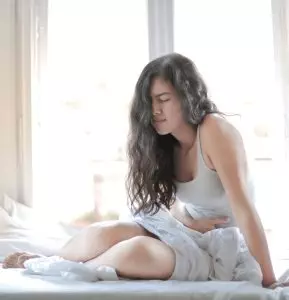
Chronic diarrhea, explosive diarrhea, diarrhea after eating? Diarrhea may be related to IBS (irritable bowel syndrome), or an IBD (inflammatory bowel disease), or a reaction to a food allergy, parasites, or stress. Acupuncture and TCM offer an alternative diarrhea treatment, so you can get relief from stomach pain and diarrhea.
Why Do I Have Diarrhea?
There can be many different causes of diarrhea, also known as loose stool. Acute diarrhea, which only lasts one or two days, will usually go away on its own.
Watery diarrhea that lasts a few days is usually due to food poisoning. Eating something that was rotten, or not cooked properly to destroy bacteria, can cause vomiting and diarrhea. Watery diarrhea can also happen when you have some type of viral infection, such as the “stomach flu.”
Chronic diarrhea, or persistent diarrhea, which lasts for weeks, or bouts of diarrhea that come and go frequently, may be related to IBS symptoms, IBD symptoms, Celiac disease, SIBO, or some other problem.
More than 6% of adults in the U.S. report having chronic diarrhea. Chronic diarrhea in children is also a serious health concern worldwide.
Top 10 Causes of Diarrhea
Diarrhea is a common condition that everyone experiences sometimes. Usually it is temporary, but it can become persistent and serious enough to require diarrhea treatment. The most common reasons a person experiences loose bowel movements include:
- Bacterial infection, traveler’s diarrhea, food poisoning, unsafe drinking water
- Viral infection, such as rotavirus, viral gastroenteritis, stomach flu
- Parasite infection, such as giardiasis
- Food allergy, food intolerance, food sensitivity, Celiac disease
- Reaction to medications like antibiotics, antidepressants, or Metformin
- Reaction to radiation therapy, cancer treatment
- IBS – diarrhea, constipation, and stomach cramps are common IBS symptoms
- IBD – colitis or Crohn’s disease, inflammatory autoimmune disorders that affect the gut
- Malabsorption of food, poor absorption of nutrients
- Menstrual cycle or Perimenopause – changes in hormones/estrogen can cause diarrhea
Certain foods can cause diarrhea, including: too much coffee, artificial sweeteners like mannitol and sorbitol, and red food coloring. Magnesium supplements can also cause loose stools.
If diarrhea lasts more than a few days, it is important to seek healthcare advice. Chronic diarrhea can lead to dehydration and fatigue, and may be happening because of some more serious condition that needs to be addressed.
What Causes Chronic Diarrhea?

Bouts of diarrhea that keep recurring can be a symptom of disorders such as:
- IBD (inflammatory bowel disease) – the most common IBDs are ulcerative colitis and Crohn’s disease. IBD symptoms usually include bloody diarrhea and abdominal pain. IBDs can cause chronic or recurring diarrhea, which can lead to dehydration, fatigue, and weight loss. IBDs can be mild, or so serious that they cause long-lasting damage to the gastrointestinal tract.
- Ulcerative colitis – an autoimmune disorder that causes inflammation and ulcers, or open sores, in the lower gastrointestinal system, including the colon and rectum.
- Crohn’s disease – an autoimmune disorder that causes inflammation mainly in the small intestine, but can affect any part of the GI tract.
- IBS – Irritable bowel syndrome can seem similar to IBDs, also causing recurring bouts of diarrhea and stomach pain. However, IBS is considered a functional gastrointestinal disorder. It is quite common. People with IBS symptoms may have alternating bouts of diarrhea and constipation. People who tend to have more diarrhea-dominant IBS have “IBS-D.”
- Celiac disease – an autoimmune disorder in which a reaction to eating wheat gluten causes serious inflammation of the GI system, leading to abdominal pain, bloated stomach, diarrhea, malnutrition, fatigue, and skin rashes.
With these conditions, diarrhea is brought on periodically—sometimes alternating with constipation, as in some cases of IBS—by factors having to do with the diet or stress, or with autoimmune processes.
Some surgeries that affect the gastrointestinal organs—like gastric bypass, gastric sleeve, or gallbladder removal—can cause chronic diarrhea.
Chronic diarrhea can be caused by an inability of the intestinal walls to absorb nutrients, and/or of the walls of the colon to absorb liquid. It may also be due to excessive action of the intestine in terms of peristalsis, the squeezing of the intestine to move matter through.
Diarrhea Treatment
Acute diarrhea usually goes away on its own in a day or two. Often, people will use OTC remedies for diarrhea and stomach pain, such as Immodium or Pepto-Bismol.
If you have been experiencing persistent diarrhea and seek medical advice, a doctor will perform tests to figure out what is causing the diarrhea, and will offer electrolyte fluids to help with dehydration. Blood tests or a stool test will show if the diarrhea is due to a bacterial infection or parasitic infection.
If chronic diarrhea is determined to be related to a medication you are already taking, then that may need to be adjusted.
Discovery of IBS or an IBD usually involves more diagnostic testing, including a colonoscopy and/or endoscopy, to see if there is inflammation or blockage in the GI tract.
Medical treatment for IBS may involve being offered antispasmodic medications that relax the intestinal walls and slow down the movement of the bowels and can help relieve stomach cramps and abdominal cramping. Dietary changes and behavioral therapy may be recommended.
Pharmacological treatment for IBDs like colitis and Crohn’s usually involves taking a combination of anti-inflammatories and immunosuppressants, to reduce inflammation in the gut and to block the inappropriate autoimmune responses that are triggering the inflammation. Unfortunately, steroids and medications like Xeljanz can cause other side effects and health problems.
Medical treatment for chronic diarrhea may help relieve symptoms and reduce the frequency of bouts of diarrhea, but it does not necessarily address the underlying causes of diarrhea.
Acupuncture and TCM offer an effective alternative treatment for diarrhea that is more suited to each patient’s individual situation.
Can Acupuncture Help Diarrhea?
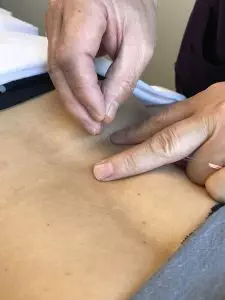
Chronic diarrhea, according to TCM theory, is usually considered to be related to the health of the spleen. In TCM, the organ systems all interact harmoniously, unless there is imbalance. The imbalance of one organ system may throw off other systems, leading to various symptoms.
In TCM, the spleen is responsible for breaking down the nutrients from food and converting them into energy. If the spleen is not functioning properly, watery stool is often the result. Diarrhea, stomach pain, and other symptoms may differ from person to person, depending on how the spleen is interacting with the liver, stomach, or kidneys.
Common Chinese Medicine diagnosis patterns for chronic diarrhea include:
- Spleen Deficiency with Liver Qi stagnation: mucus in the stool, abdominal pain, cramping, gassiness, bloated stomach, irritability, and feelings of depression
- Spleen Deficiency with Stomach deficiency: watery stools, poor appetite, feeling full quickly, stomach distended after eating, pallor, and fatigue
- Spleen Deficiency with Kidney Deficiency: diarrhea in the morning, partially digested food in the stool, abdominal pain, lower back pain, knee pain, feeling cold
Acupuncture treatment for diarrhea, which may include moxibustion and herbs, aims to support the health of the spleen and other organs. Acupuncture has been shown to help relieve diarrhea and constipation related to IBS. Acupuncture treatment can also help with reducing stress and anxiety, which are common triggers for IBS symptoms.
Acupuncture can also help with diarrhea due to IBDs like ulcerative colitis and Crohn’s disease by reducing inflammation and helping to balance immune responses. TCM treatment for Crohn’s disease or colitis, incorporating nutrition and herbal supplements, can help improve the gut biome and strengthen the lining of the intestinal walls.
Acupuncture for Diarrhea Near Me, Los Angeles, West L.A., and Santa Monica
TCM treatment with an experienced acupuncturist near me can be very beneficial for anyone dealing with ongoing gastrointestinal distress. Both adults and children can find relief from diarrhea, constipation, stomach cramps, bloating, and abdominal pain related to conditions like IBS, IBDs, or celiac disease through acupuncture and herbs. At Art of Wellness, we have over 30 years of experience helping people with gastric disorders of all kinds.
*This article is for education from the perspective of Traditional Chinese Medicine only. The education provided by this article is not approved by FDA to diagnose, prevent, treat and cure human diseases. It should not stop you from consulting with your physician for your medical conditions. Traditional Chinese Medicine is based on Qi, which is an invisible force that usually cannot be observed by modern science. Because science focuses on testing ideas about the natural world with evidence obtained through observation, these aspects of acupuncture can’t be studied by science. Therefore acupuncture and Chinese herbs are often not supported by double-blind, randomized trials, and they are considered alternative medicine therapies in the United States.